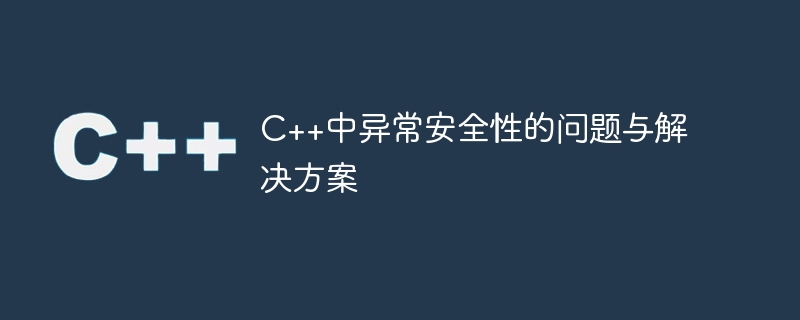

Problems and Solutions of Exception Safety in C
Introduction:
Exception handling is an important aspect in the C programming process. The occurrence of exceptions may cause the program to crash, seriously affecting the stability and reliability of the program. Therefore, exception security is an issue that needs attention. This article will explore exception safety issues in C, provide solutions, and give specific code examples.
1. Exception security issues:
In C, the occurrence of exceptions may lead to resource leaks, data inconsistencies and other problems. The following are some common exception safety issues:
1. Memory leak:
When an exception occurs, if the program does not correctly release the allocated memory, it will cause a memory leak. This may cause memory consumption to continue to increase while the program is running, eventually exhausting the system's memory resources.
2. Data inconsistency:
When an exception occurs during program processing, it may lead to incomplete deconstruction of the data structure, thereby destroying the consistency of the data. This will cause unpredictable errors in the subsequent behavior of the program.
3. Resource leakage:
In addition to memory leaks, other resource leaks may also occur. For example, file resources, network connections, etc. If these resources are not released correctly when an exception occurs, it will cause excessive resource consumption of the system and eventually lead to system instability.
2. Solution to exception security:
In order to improve the exception security of the program, we can adopt the following solutions:
1. Use the RAII (Resource Acquisition Is Initialization) principle :
RAII is a programming technique that ensures the correct handling of resources by acquiring resources in the object's constructor and then releasing the resources in the destructor. Using this technique, you can ensure that resources are released correctly under any circumstances.
The following is a sample code that obtains resources in the constructor and then releases the resources in the destructor:
class ResourceHolder {
public:
ResourceHolder() {
// 获取资源
m_resource = new Resource();
}
~ResourceHolder() {
// 释放资源
delete m_resource;
}
void doSomething() {
// 使用资源
m_resource->doSomething();
}
private:
Resource* m_resource;
};When using the ResourceHolder object, no matter what exception occurs, the resource will be correctly freed.
2. Use smart pointers:
C 11 introduces smart pointers, which provide a way to automatically manage dynamically allocated resources. When an exception occurs, smart pointers can automatically release resources to avoid resource leakage problems.
The following is a sample code using std::shared_ptr:
std::shared_ptrresource = std::make_shared (); resource->doSomething();
In this example, if an exception occurs, std::shared_ptr will automatically call the destructor and release the Resource resource.
3. Use exception-safe algorithms and containers:
The C standard library provides some exception-safe algorithms and containers to ensure data consistency when exceptions occur.
For example, using std::vector instead of a normal array can avoid memory leak problems. Because std::vector will automatically call the destructor to release memory when an exception occurs.
In addition, the algorithms of the C standard library, such as std::sort, std::copy, etc., also provide exception safety guarantees.
Conclusion:
In the process of C programming, exception safety is an issue that needs attention. By using RAII, smart pointers and exception-safe algorithms and containers, the exception safety of the program can be effectively improved. When writing code, we should develop a good awareness of exception safety, handle possible exceptions in a timely manner, and ensure the stability and reliability of the program.
Reference:
The above is the detailed content of Problems and solutions to exception safety in C++. For more information, please follow other related articles on the PHP Chinese website!




